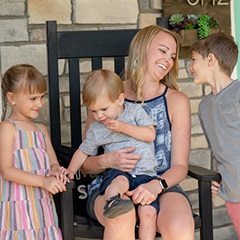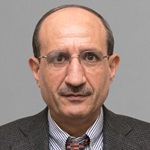Cassidy’s Story: Overcoming Major Heart Attack Days After Giving Birth
Having a massive heart attack days after delivering her son was not a fate Cassidy Helman
ever imagined for herself. Nor could the 31-year-old have predicted the extraordinary chain of events that would save her life and restore her to health.
It started on a Monday in April in Greenville, Ohio, just 10 days after Cassidy delivered her third child, Declan. Cassidy was at home on maternity leave from her job as a seventh grade math and science teacher at Versailles Middle School in Versailles, Ohio.
“Around 3 or 4 in the afternoon, I started having pressure in my chest, with tingling and a numb feeling in my arms,” Cassidy recalls. “Around 5, my husband, Daniel, got home from work. I thought I was just tired and overwhelmed. He was the one who said this is not normal and that we had to go to the emergency room immediately.”
 They dropped off Declan and their older son and daughter with Cassidy’s parents, who lived across the street. The couple sped to Wayne HealthCare, their neighborhood hospital. The emergency staff took Cassidy right away and performed an
EKG once and then twice before hurrying away to find a doctor.
They dropped off Declan and their older son and daughter with Cassidy’s parents, who lived across the street. The couple sped to Wayne HealthCare, their neighborhood hospital. The emergency staff took Cassidy right away and performed an
EKG once and then twice before hurrying away to find a doctor.
The emergency doctor soon came in to pronounce that Cassidy was having a heart attack. A CareFlight helicopter was considered and ruled out because a big storm was blowing into the area. Paramedics arrived in an ambulance to take Cassidy to a Premier Health facility in Dayton, Ohio, about 40 miles south of Greenville. Daniel and Cassidy’s father followed in their cars.
During the ambulance ride, Cassidy kept her eyes on the heart monitor, comforted by the paramedics’ reassurances that it was probably minor and she could be fixed up with a stent or two. After all, she had no health problems or family history of heart disease. She had been fit and athletic all her life.
A Life-Saving Procedure
Interventional cardiologist Ahmad Abdul-Karim, MD, of Premier Cardiovascular Institute was ready in a catheterization lab when Cassidy arrived. Dr. Karim immediately prepared her for an angiogram to look at her coronary arteries. He soon identified a rare, life-threatening condition called spontaneous coronary artery dissection (SCAD). The lining of four major coronary arteries was separating and shredding, creating an obstacle for blood to flow smoothly to Cassidy’s heart muscle. Dr. Karim later told Cassidy that the cause of SCAD is unknown, but he had seen it in one or two women shortly after they gave birth.
Awake during her angiogram procedure, Cassidy will never forget the moment Dr. Karim told her, “You’re going to need open heart surgery tonight – a quadruple bypass.”
That’s when she began to panic. “I started crying,” she says. “I thought, ‘How can this be happening?’” A few hours ago, she had been at home in Greenville getting ready for dinner and now she was in Dayton getting ready to have open heart surgery.
Daniel and Cassidy’s father joined her in the cath lab and called her mom and older brother. Cassidy didn’t learn until later how serious her situation had become.
Around 10:30 that night, Cassidy’s cardiothoracic surgeon began a six-hour open heart surgery. One of the nurses who had just finished a shift came back to assist with the case. First the surgeon removed veins from Cassidy’s legs and used a blood vessel from her chest as bypass grafts to take over the work of the four dissecting arteries. He opened her chest and went to work on her heart.
The surgery went well, restoring normal blood flow to Cassidy’s heart muscle. Within hours, Cassidy was recovering in the Cardiovascular Intensive Care Unit, with her parents, husband and brother surrounding her.
Reclaiming Her Life
Recovering from having a baby and open heart surgery, all within two weeks, took time and the support of family, friends, and an entire community. One friend coordinated meals to be delivered to Cassidy and her family. Her sister flew in from Kansas City to help with the children. Her mom took family medical leave from her job to care for Cassidy and the baby over a number of months.
Cassidy says living through this life-threatening event has changed the way she approaches life. “I’ve always had a plan, always wanted to be in control. This taught me you can’t plan everything.”
She’s also trying to listen to her own body, noting that women often put everyone else before themselves.
She encourages other women to pay attention to the warning signs of a heart attack: chest pain, shortness of breath, rapid heartbeat, pain in the arm, shoulder or jaw, extreme fatigue, nausea or dizziness. She acknowledges that she might have brushed off her symptoms if her husband hadn’t insisted on seeking help.
Eight weeks after recovering from surgery, Cassidy entered cardiac rehab. “For the longest time, I was afraid to do anything,” Cassidy says. “Cardiac rehab was so helpful. They knew my limits better than I did. By the time I left, I felt confident.”
To protect her bypass grafts, Cassidy has lifelong restrictions to lift no more than 35 pounds, and doctors have advised her to keep her heart rate under 130 beats per minute. She shouldn’t ride roller coasters or sky dive, but she walks a half hour every single day and plays with her kids. She picks up 2-year-old Declan whenever she feels like it, savoring the experience until the time when he weighs more than 35 pounds.
Cassidy says she gets emotional thinking about things she would have missed had she not had a team of people providing exactly what she needed at the time of her heart attack. “I went to a wedding recently and watched the parents walk down the aisle. I thought I wouldn’t have been here to do that. I’m so lucky I’m here.”

Contact Us
Every moment of your life depends on a strong, healthy heart. The Premier Health cardiology and vascular services team is here to help you, each beat of the way, with prevention, diagnostic, treatment, and rehabilitation services in our hospitals, outpatient centers, and medical offices across Southwest Ohio.

